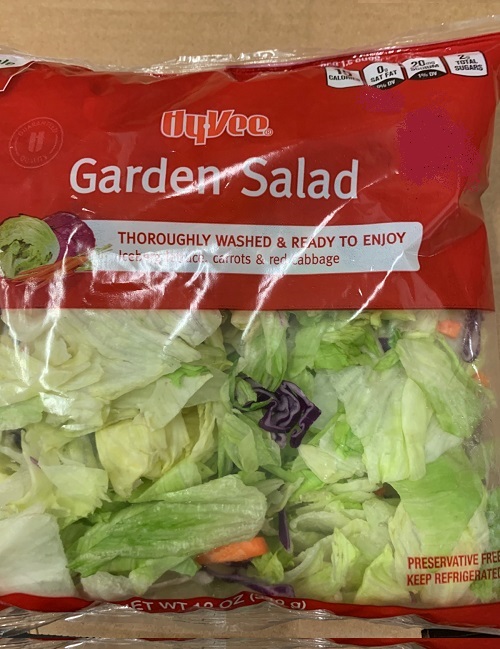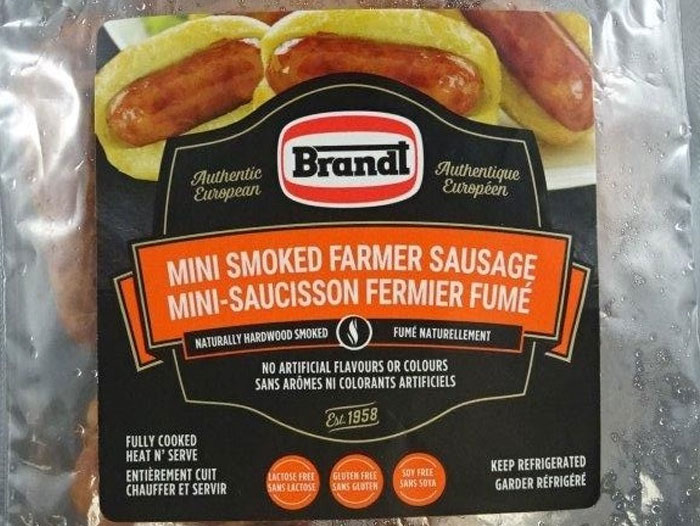The CDC, FDA, and local partners are investigating a multistate outbreak of Cyclospora infections linked to bagged salad mix purchased at ALDI, Hy-Vee, and Jewel-Osco stores in Iowa, Illinois, Kansas, Missouri, Minnesota, and Nebraska. The recall includes all ALDI Little Salad Bar Brand Garden Salad sold Iowa, Illinois, Missouri, and Minnesota; all Hy-Vee Brand Garden Salad. As of June 19, 2020, a total of 76 people with laboratory-confirmed Cyclospora infections associated with this outbreak have been reported from 6 states: IA (28), IL (23), KS (1), MN (10), MO (7) and NE (7). The products were sold in Iowa, Illinois, Kansas, Missouri, Minnesota, and Nebraska, and all Jewel-Osco Signature Farms Garden Salad sold in Illinois. Illnesses started on dates ranging from May 11, 2020, to June 14, 2020. Sixteen people have been hospitalized. No deaths attributed to Cyclospora have been reported. Epidemiology evidence indicates that ALDI Little Salad Bar Brand Garden Salad, Hy-Vee Brand Garden Salad, or Jewel-Osco Signature Farms Garden Salad are likely sources of this outbreak, but does not explain all of the cases. @ https://www.cdc.gov/parasites/cyclosporiasis/outbreaks/2020/
ruth
CDC and federal, state, and local public health partners are investigating an increase in reported cases of Cyclospora infection (cyclosporiasis). Reports of cases tend to increase during summer months in the United States.
ruth
The coronavirus infected workers at a slaughterhouse in Germany. Germany is attempting to stop the virus after 650 workers in the western state of North Rhine-Westphalia tested positive for Covid-19.
Toennies, the company that owns the meat processing facility, temporarily shut the plant. The plant had several foreign workers who have traveled in recent weeks and might have been carrying the virus with them. As in the US, Germany also has seen outbreaks in meat facilities. In reaction to the outbreaks, the German government announced it would bring in new laws to protect the workers. Outbreaks of coronavirus among workers in the food industry in the United Kingdom and Canada have also been reported. @ https://amp.cnn.com/cnn/2020/06/18/europe/germany-meat-processing-plant-coronavirus-cases-intl/index.html
Germany is racing to stop a new coronavirus outbreak after 650 workers at a slaughterhouse in the western state of North Rhine-Westphalia tested positive for Covid-19.
ruth
Reuters report that the Chinese authorities found in Beijing’s wholesale food market, in the meat and seafood sections, heavy contamination with coronavirus. The area’s low temperature and high humidity of this section of the market may have been contributing factors to the contamination. Beijing is tackling a resurgence of COVID-19 cases over the past week linked to the massive Xinfadi food center, which houses warehouses and trading halls. Among the patients who work at the Xinfadi market, most worked at seafood and aquatic product stalls, followed by the beef and mutton section. Patients from the seafood market showed symptoms earlier than others in the market. Low temperatures favorable to viral survival, as well as high humidity, might be possible explanations for why seafood markets could be a source of outbreaks based on a preliminary assessment. Health officials have also warned against eating raw salmon after the virus was discovered on chopping boards used for imported salmon, although the origin of the outbreak is not known. Low standards of hygiene in wholesale food markets and vulnerabilities in its food supply chain need to be urgently addressed, a leading body of the ruling Communist Party said this week. @ https://www.reuters.com/article/us-health-coronavirus-china-seafood/china-finds-heavy-coronavirus-traces-in-seafood-meat-sections-of-beijing-food-market-idUSKBN23P20T
China has found the trading sections for meat and seafood in Beijing’s wholesale food market to be severely contaminated with the new coronavirus and suspects the area’s low temperature and high humidity may have been contributing factors, officials said on Thursday.
ruth
G. Brandt Meat Packers Ltd. In Ottawa, Canada recalled Mini Smoked Farmer Sausage from the marketplace due to possible Listeria monocytogenes contamination. The recall is of three sizes of Mini Smoked Farmer Sausage (0.450 kg, 0.375 kg, and various sizes). These products were sold in Alberta, Ontario, Quebec, and Saskatchewan at the retail consumer level. This recall was triggered by the Canadian Food Inspection Agency (CFIA) test results. The CFIA is conducting a food safety investigation, which may lead to the recall of other products. There have been no reported illnesses associated with the consumption of these products.@ https://www.perishablenews.com/
G. Brandt Meat Packers Ltd. is recalling Mini Smoked Farmer Sausage from the marketplace due to possible Listeria monocytogenes contamination. Consumers should not consume the recalled products described. …



